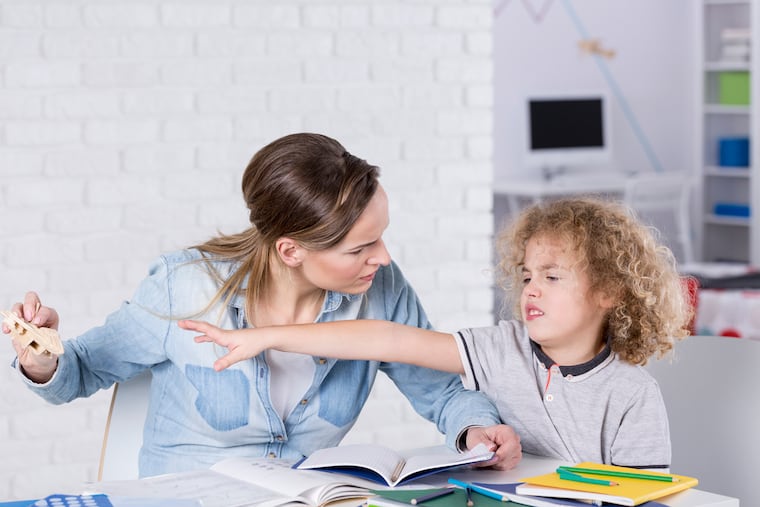5 common mistakes parents make with their ADHD kids and how to fix them
My five C's of ADHD parenting — self-control, compassion, collaboration, consistency and celebration — have helped hundreds of families reduce their stress, build closer relationships and improve day-to-day living.

After another day of struggling with your ADHD child about school, chores and technology, do you ever feel like giving up? Many parents of kids with ADHD are frustrated and dejected from the daily yelling and push-back. How can you hang in there and do things differently?
Children and teens with ADHD depend on you to teach them the crucial executive functioning skills such as self-regulation and organization that they need for success. In more than 25 years of clinical practice and leading workshops, I've seen how listening to the voices of kids diagnosed with ADHD improves cooperation and success. My five C's of ADHD parenting — self-control, compassion, collaboration, consistency and celebration — have helped hundreds of families reduce their stress, build closer relationships, and improve day-to-day living.
Let's look at the five typical mistakes parents make with ADHD kids and how you can overcome them:
1. Losing your temper
It's natural to get upset when someone is screaming, kicking or hitting you. But your agitation only adds fuel to the fire. Our mature, adult brains have the capacity to calm our intense emotions. Kids with ADHD, whose prefrontal lobes finish maturing after age 25, need extra assistance from you to do this.
Solution: Practice self-control. Start by managing your own feelings first so you can act effectively. This doesn't mean never getting upset or feigning calmness. Instead, notice when you're becoming riled up and try to bring yourself back. Stop what you're doing, take some deep breaths, and call a pause in the action to regroup. If you have to go into the bathroom for a short break, do that. When you're settled, then you can help your child do the same.
2. Misunderstanding their experience as a young person living with ADHD
It's tough for busy parents to remember that kids with ADHD are trying to do the best they can while living with significant executive functioning challenges. When your son forgets his history project again, he's struggling with working memory and organization, not being lazy and forgetful.
Solution: Find compassion. Meet kids with ADHD where they are, not where you think they should be. Start by having compassion for yourself. If you accept who you are, it will be easier to accept your child and the current challenges. Kids with ADHD often take longer to develop necessary life skills and require more time than you may expect.
3. Excluding their participation in solutions aimed at helping them
Kids with ADHD, even young children, have their own ideas about what isn't working and what could be better. Whether it's at school — a place where they often face social, academic or emotional challenges — or at home, they constantly hear from adults and peers about how they've missed the mark and what they should do differently, even if these ideas don't work with their brains.
Solution: Start with collaboration. When parents or educators include the opinions of kids with ADHD in their efforts to address problems, there's more buy-in and cooperation. Collaboration means working together with your child to find solutions to daily challenges instead of imposing your rules on them. This collaboration offers a "we" attitude instead of a "you" attitude. Ultimately (and in crises) you have the final word, but, when they are part of process, they participate more readily.
4. Not following through
Kids with ADHD, despite their protests, thrive on routines and predictability. When parents struggle to stick with a behavioral plan or improvise a spontaneous punishment, it's confusing. Do you mean what you say or not? If they pester you enough, do you give in?
Solution: Stay as consistent as possible without aiming for perfection. No parent can follow through all of the time. You aim for clear messages and similar consequences for the same behavior as often as possible. Consistent parenting means that you don't threaten or give your ADHD children and teens consequences that you can't enforce, remember or support. They already struggle with trial-and-error learning and benefit from having clear plans that aren't renegotiated in the heat of a moment.
5. Focusing more on the outcome, rather than their efforts along the way
Many parents, understandably, want to see immediate changes in their child's behaviors when they give feedback or start a behavioral plan. But repeatedly telling them what they could do better backfires. Kids with ADHD lose motivation and momentum.
Solution: Acknowledging progress with celebration. While you don't have to break into a cheer every time your son remembers to clear his plate or your daughter gets off her phone when asked, a high-five with a short "thanks" conveys two important messages: You noticed their efforts and you're pleased with them. Studies have found that a 3-1ratio of positive comments to negative ones makes a big difference in promoting behavioral changes and can-do attitudes.
The five C's of ADHD parenting transform your family by shifting attention away from what's not working — anger and disappointment — to building closeness and cooperation, teaching essential executive functioning skills, and fostering lifelong success.
Sharon Saline, Psy.D. is a licensed psychologist who specializes in ADHD and teens, children and families. Her first book, "What Your ADHD Child Wishes You Knew: Working Together to Empower Kids for Success in School and Life," was released Aug. 7. For more information about workshops and parenting tips visit her website, www.drsharonsaline.com.